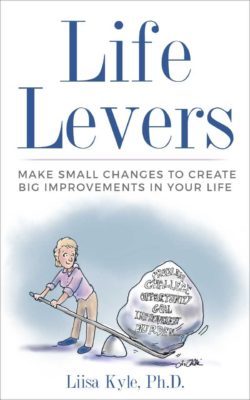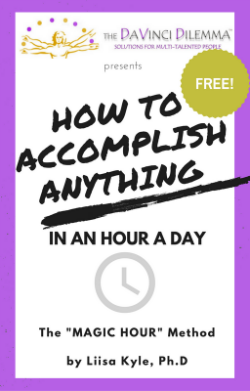 If you’re dealing with distractions, stop multi-tasking long enough to read this post!
If you’re dealing with distractions, stop multi-tasking long enough to read this post!
You know those commercials for that security system, where a woman is home alone and her jealous ex or the charming stranger who just left her dinner party kicks in her door? The siren goes off, scaring off the attacker, and a calm, friendly yet concerned man on the phone asks if she’s all right. The woman nods gratefully, knowing that she’s had a fortunate escape.
If only we DaVincis had an alarm around our minds for the thieves that break in and steal our focus! Instead of dealing with distractions like the enemies they are, many of us have cut them keys and invited them to move in.
In his time management program The Time of Your Life,Tony Robbins singles out three types of distractions that eat up our time: dealing with urgencies in our lives, meeting the demands of other people, and escapist activities (TV, web surfing, video Scrabble) to get out of the stress of the first two. DaVincis can add another big factor that rob them of their focus — their own plethora of ideas and creative projects. Even if nothing else happens to distract us, we simply distract ourselves. One idea leads to another, and before we know it, we’re down a rabbit warren that’s led us from what we had planned to work on, and lost hours in the process.
At best this blue-sky-ing is simply part of the typical DaVinci creative process and should be honored. At worst, it keeps us from getting any meaningful work done and keeps us frustrated and dissatisfied. I’ve heard this referred to as Bright, Shiny Object Syndrome or even ADD or ADHD. But for most of us, there’s no need to put a medical label on it. We’re not sick, our creative muscles are just better developed than our discipline ones. We haven’t made up our minds that dealing with distractions by focusing our minds is a smart thing to do.
Maybe we’re afraid of missing a peak experience. For an entrepreneur, it can be the fear of losing a great business idea into the ether unless we follow up on it right away. It seems like a reasonable explanation, but the result can be day after day of spinning our wheels, busy all the time with not a lot to show for it.
Activity: Build your security system.
Fortunately, when dealing with distractions, there are ways to keep the focus thieves out. Try one, a couple or all of these techniques.
-
Set your intentions for the day first thing. What do you really want to accomplish today? Why? Remember to have no more than three main intentions. One is just fine. Make sure to do something on this before exposing yourself to any demands — such as your pile of bills, your to-do list or worst of all – your email which is bound to be full of other people’s demands or dramas. These can wait.
-
Big Rocks First. (closely related to #1) Many of you will know the famous story of the professor who show filled a glass jar with fist-sized rocks and asked the class if the jar was full. They answered “yes”. He said, “really?” and proceeded to dump a bucket of gravel into the jar. The gravel filled in the spaces. He then asked again if the jar was full. This time the class wasn’t sure. He then dumped a bucket of sand into the jar. He used this as a metaphor; had he filled the jar with sand first, there would have been no room for the big rocks. The big rocks are what’s truly important to you. Once you determine what those things are, make sure they get done before the minutia. Otherwise that itty-bitty sand and gravel will bury your life.
-
Have a Big Vision. Of course, it helps to know what your Big Rocks are. Check in with yourself once a week and review your major goals and desired outcomes in all the categories of your life and work. This will keep you focused on the big picture, like that creative project you want to accomplish.
-
Keep a pad and a Someday/Maybe folder. Having a place to park those random great ideas will help you feel better about not addressing them right now. In his seminal book Getting Things Done, time-management guru David Allen advises keeping a “Someday/Maybe” folder or list, for those ideas that you don’t want to lose, forget or let go of but that don’t fit into your schedule right now.
-
Avoid multi-tasking. You’re probably really good at it, and you’ve become addicted to doing three — or more– things at once. However, studies have showed that people’s actual performance is of lower quality when they multi-task, and spinning all those plates causes stress. Worse, the habit absolutely invites brand new distractions to come a-knocking. After all, you’re already doing or thinking about 100 things, what’s one more? Give yourself the gift of doing only one thing at a time, and when you catch yourself adding another (and you will) stop.
-
Adopt Fearsome Focus.(closely related to #4) This is a term I learned from marketing guru Dave Lahkani, but I’ve heard master coach Bill Baren refer to this as a Power Hour as well. When concentrating on one of your Big Rock outcomes, make it a point to focus for a set period of time and allow absolutely no distractions or interruptions. Lahkani does 50 minutes on task, followed by a 10-minute break. Use whatever period of time works for you. Maybe start with 20 minutes and work up to 30 or 50. Hang a “do Not Disturb” sign on your brain during that time. Jot random ideas on pad as quickly as possible and get back to your main task. Assemble everything you need before you start. If possible, turn off your phone and whatever you do, don’t look at your email!
-
Corral danger activities. For many people dealing with distractions, the culprit is email. For me, it’s Twitter and other social media. These are activities that are necessary to do but become easy to get lost in and difficult to quit. These always remind me of the “trigger foods” I heard about in Weight Watchers. For example, I can’t have just a few M&Ms. So it’s smarter for me to have a small pack, rather than a five pound bag, in the house. Know what your trigger activities are and limit them to a specific time of day and amount of time. A kitchen timer will save your life.
-
Don’t be reachble 24/7. (closely related to #6) This is one I learned from Tim Ferriss’ 4 Hour Work Week. He put an auto-response on his email informing people that he would be checking email at noon and 4 PM only, so not to expect a response until then. He also suggests an idea I think is genius, telling people at the top of a phone call, “I’ve got 10 minutes. What can I do for you?” This sets expectations and gets them to get to the point, not allowing either of you to get distracted with a lot of irrelevant chatter, and giving you an escape hatch to get off the phone.
-
Plan to goof off. Instead of allowing the siren song of TV or Facebook or a long phone chat with a girlfriend entice you away from an activity you care about, schedule that mindless, random or just plain fun time. Tivo that show, and set a time to call your friends or leaf through fluffy magazines without guilt. Make the dumb stuff a treat to look forward to, and it won’t be a distraction now.
Focus doesn’t happen by accident for anyone, and for DaVincis it really needs to be intentional. Those focus thieves will come — but now you’ll be ready for them.
What steals your focus most often? What can you do about it? Got any great tips? Please share your thoughts here.
*****
If you’d like to share or publish this article, you may, if you include the author’s name, a link to this original post and the following text blurb:
Are you struggling with too many talents, skills, ideas? You may have The Da Vinci Dilemma™! Find tools, fun quizzes, coaching, inspiration and solutions for multi-talented people at http://www.davincidilemma.com/.




Wow, I need to work on all of these, but in particular #7 Corral Danger Activities and #8 Don’t be reachable 24/7. And really for me they’re the same. I’m pretty good about not jumping when the phone rings (but I still usually check to see who it is even if I know I can’t return the call till later) but when email comes in I’m so concerned about forgetting it (and therefore not getting back to it) that it’s hard for me to resist. Thanks for these reminders.
Bruce Brown
http://www.beingbrucebrown.com
QuantumResultsCoaching.com